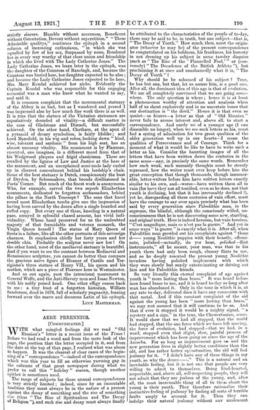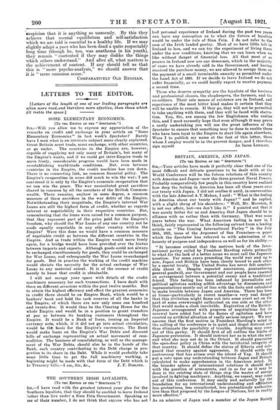W ITH what mingled feelings did we read "Old Etonian's "
letter in a recent issue of the Times ! Before we had read a word and from the mere look of the page, the position that the letter occupied in it, and from the date at the top of that page, I realized what was about to happen. It was the clearest of clear cases of the begin- lung of a " correspondence "—indeed of the correspondence which was this year to fill an otherwise yawning gap in the columns of that great newspaper during what we prefer to call this " holiday " season, though another epithet is sometimes used.
The range of subjects for these annual correspondenoes is very strictly limited ; indeed, since by an immutable tradition they must always be in 'the nature of a protest against the decay of something and the rise of something else (thus " The Rise of Spiritualism and The Decay of Religion "), and finch rise and decay must always finally be attributed to the characteristics of the people of to-day, there may be said to be, in truth, but one subject—that is, " The Decay of Youth." How much, then, must the origin- ator (whoever he may be) of the present correspondence be congratulated on his boldness, his frankness, his honesty in not dressing up his subject in some tawdry disguise (such as " The Rise of the Flannelled Fool," or (con- versely) " The Decadence of the British Athlete "), but proclaiming it at once and unashamedly what it is, " The Decay of Youth " ?
Why should he be ashamed of his subject ? True, he has but one, but that, let us assure him, is a good one. After all, the dominant idea of this age is that of evolution. We are all completely convinced that we are going sonic- where. The only question is where ; hence it is at least a phenomenon worthy of attention and analysis when half of us shout explosively and in no uncertain tones that our destination is the devil." Hence it is that even so quaint—so bizarre.--a letter as that of " Old Etonian " never fails to arouse interest and, above all, to start a correspondence. And surely we of a younger age (I can dissemble no longer), when we see such letters as his, must feel a spring of admiration for two great qualities of the older generation well up in our hearts—I mean the qualities of Perseverance and of Courage. Think for a moment of what it would be like to have to write such a letter as his. Consider the haunting images of all tho letters that have been written down the centuries in the same sense—nay, in precisely the same words. Remember how such weak, such unmanly thoughts must be sternly repressed, how the writer must ever keep before him the great conception that though thousands, though innumer- able, letter-writers before him have written letters exactly similar to his own, and—worse—have written them all in vain (for have they not all testified, even as he does, not that youth is declining, but that it has irrevocably declined ?), yet he, disregarding all these centuries of vain effort, must have the courage to say over again precisely what has been said by every generation since Paleolithic man, in the supreme, the blissful, although the consciously willed, un- consciousness that he is not discovering some new, startling, and original truth. Here is indeed heroism, but vain heroism. "C'est magnifique, mais ce n'est pas la guerre." And yet in some ways " la guerre " is exactly what it is. After all, when Paleolithic man growled out his complaints against " those d— young Neolithic puppies with their beastly, effemi- nate, polished—actually, do yer hear, polished—flint instruments," all he meant, poor man, was that in his youth there had only been rough, clumsy flints to use, and so he deeply resented the present young Neolithic invaders having polished implements with which they were slowly but surely exterminating or driving out him and his Paleolithic friends.
So very literally this eternal complaint of age against youth is more lasting than brass." It was heard before men found brass to use, and it is heard to-day so long after man has abandoned it. Only in the tong in which it is, at any rate to-day, delivered does it have any connexion with that metal. And if this constant complaint of the old against the young has been " more lasting than brass," we may rest assured that it will continue to be so. And that if ever it stopped it would be a mighty signal, " a mystery and a sign," in the true, the Chestertonian, sense. It would show that we had all stopped, that the world had stopped, that the one force which we have left moving, the force of evolution, had stopped—that we had, in a word, stopped even that slight, slow, painful process of improvement which has been going on since the age of the Amoeba. For as long as improvement goes cc and the new generation lives in slightly better conditions than the old, and has rather better opportunities, the old will feel jealousy for it. " I didn't have any of these things in my youth, so why the deuce—." This is a natural and an inevitable feeling, but it is not one that people are very willing to admit to themselves. Being kind-hearted, respectable, and, above all, self-respecting people, they will not admit that they are jealous of the young, and, after all, the most inexcusable thing of all to them about the young is their youth. They therefore rationalize their instinctive feeling of jealousy by finding all sorts of terrible faults amply to account for it. Thus they can indulge their natural jealousy without anY unuleasant suspicion that it is anything so unseemly. By this they achieve that mental equilibrium and self-satisfaction which we are told is essential to a healthy life. If we may slightly adapt a poet who has been dead a quite respectably long time (though he, too, was anathema in his youth), they remain " contented if they may dislike the things which others understand." And after all, what matters is the achievement of content. If any should tell us that this is " mere psycho-analysis," we should answer that it is " mere common sense."
COMPARATIVELY OLD ETONIAN.



































 Previous page
Previous page